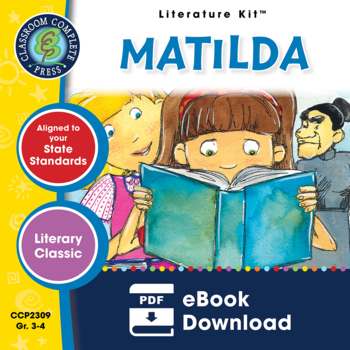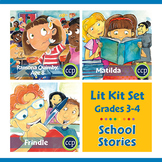Matilda - Literature Kit Gr. 3-4
- PDF
Also included in
- In this State Standards-aligned Literature Kit™ Set, we combine 3 of our school stories novel study guides for grades 3-4. Take a Peek Inside:Each guide divides the novel by chapters or sections and feature reading comprehension and vocabulary questions. In every chapter, we include Before You ReaPrice $29.95Original Price $38.85Save $8.90
Description
A Literature Kit for the novel Matilda written by Roald Dahl.
Take a Peek Inside:
Explore the power of the mind and how anything is possible if you put your mind to it. Challenge students by expanding their vocabulary and testing their comprehension with writing prompts and assessment questions. Test comprehension with multiple choice questions that explores the character of Matilda. Expand your character study by reflecting on Matilda's view of C.S. Lewis' novels, and what she considers to be a drawback in them. Show understanding of tricky words from the book by matching them to sentences where they make the most sense. Conduct an interview with a partner to find out what they think of the novel. Compare physical and character attributes of two people from the story in a Compare/Contrast chart.
About the Novel:
Matilda is the charming story of a very unusual little girl who, despite having two very horrible parents, learns how to read by the age of three. There are many other things about Matilda that are very special. She can solve arithmetic problems very quickly in her head, and she can move things about with the power of thought. Despite all of this she is a most pleasant little girl who is well liked by her classmates and by her wonderful teacher, Miss Honey. Matilda discovers the headmistress of the school, Miss Trunchbull, is actually Miss Honey‘s aunt and has cheated her out of her inheritance. Matilda sets her mind to work, and in the end Miss Honey recovers her stolen inheritance and adopts Matilda.
Aligned to your State Standards and written to Bloom's Taxonomy, additional crossword, word search, comprehension quiz and answer key are also included.
************************************************************************
View Similar Titles:
► The BFG - Literature Kit Gr. 3-4
► James and the Giant Peach - Literature Kit Gr. 3-4
► Roald Dahl Lit Kit Set Gr. 3-4
************************************************************************
Aligned to Common Core
RL.3.1, RL.3.2, RL.3.3, RL.3.4, RL.3.5, RL.3.6, RL.3.7, RL.3.10, RL.4.1, RL.4.2, RL.4.3, RL.4.4, RL.4.6, RL.4.10, RF.3.3, RF.3.4, RF.4.3, RF.4.4, W.3.1, W.3.2, W.3.3, W.3.4, W.3.7, W.3.8, W.4.1, W.4.3, W.4.4, W.4.7, W.4.8, W.4.9
************************************************************************
Check out our sister TPT shops:






